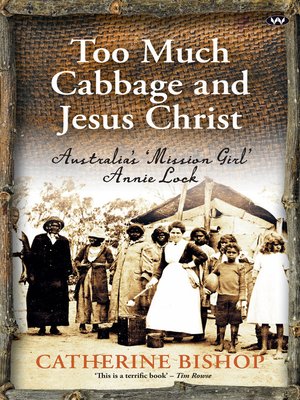
Sign up to save your library
With an OverDrive account, you can save your favorite libraries for at-a-glance information about availability. Find out more about OverDrive accounts.
Find this title in Libby, the library reading app by OverDrive.



Search for a digital library with this title
Title found at these libraries:
| Library Name | Distance |
|---|---|
| Loading... |
Who was responsible for the 1928 Coniston Massacre in Central Australia where a police party killed 100 Aboriginal people? Not those who pulled the trigger, according to the Enquiry. Instead it was 'a woman missionary living amongst naked blacks'. This was Annie Lock, the 'whistle-blower' who caused the Enquiry.
She believed Aboriginal lives mattered, with controversial results. This biography dives into massacres, stolen generations and the thorny problem of Aboriginal missions.
A faith missionary, Annie Lock fought with Daisy Bates, met the Duke of Gloucester and inspired R.M. Williams. She was shipwrecked in a pearling lugger, drove a buggy 200 miles across desert to escape drought, produced Christmas puddings in 40-degree heat, nursed sore-ridden children, hit headlines for supposedly being 'Happy to Marry a Black', and pronounced on Aboriginal culture and policy with erratic spelling but genuine conviction.
More problematically, she 'saved' souls, 'rescued' children, eroded culture and condoned Aboriginal men beating their wives.
A strident and divisive figure, Annie Lock was appealingly eccentric but horrifyingly complicit in Australia's worst policies. Indigenous people variously called her 'lovely' and the provider of 'too much cabbage and Jesus Christ'.
She believed Aboriginal lives mattered, with controversial results. This biography dives into massacres, stolen generations and the thorny problem of Aboriginal missions.
A faith missionary, Annie Lock fought with Daisy Bates, met the Duke of Gloucester and inspired R.M. Williams. She was shipwrecked in a pearling lugger, drove a buggy 200 miles across desert to escape drought, produced Christmas puddings in 40-degree heat, nursed sore-ridden children, hit headlines for supposedly being 'Happy to Marry a Black', and pronounced on Aboriginal culture and policy with erratic spelling but genuine conviction.
More problematically, she 'saved' souls, 'rescued' children, eroded culture and condoned Aboriginal men beating their wives.
A strident and divisive figure, Annie Lock was appealingly eccentric but horrifyingly complicit in Australia's worst policies. Indigenous people variously called her 'lovely' and the provider of 'too much cabbage and Jesus Christ'.







